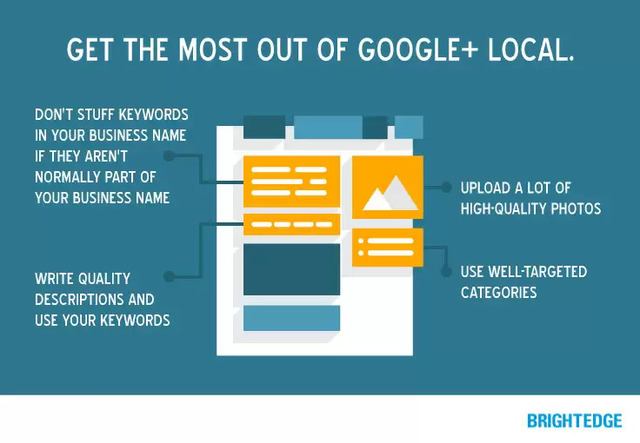You've undoubtedly heard it before: if your business has a physical location, you need local SEO. This is especially true if you've found that most of your business comes from local customers or clients. You might even be already well-versed in the elements needed to actively compete in the Google local game, but there are a few things you need to make sure you aren't overlooking. Read on for three things you need to be utilizing to get the most out of your Google local SEO.
1. Google Local SEO On-site

Make sure that your site is set up for Google local SEO. This means that you need to be using the city/state in the title tag, H1 tag, URL, content, image alt tags and meta descriptions. An optimal landing page will include the company's name, address and phone number, or NAP. The NAP on your landing page needs to match the NAP on the Google+ Local listing. Consider using a local phone number as opposed to an 800 number or call tracking; local customers like to see a local number. It's a good idea to also include things like a Google map and a photograph of the building on the landing page.
2. Google Local and Citations
Add structured citations to directories like Yelp, Urbanspoon, Zagat, etc. A structured citation looks like the following: Hash House A Go Go 6800 West Sahara Ave Las Vegas, NV 89146 (702) 804-4646 An unstructured citation is usually found on blogs, written by customers or clients of the business. It most likely consists of a few sentences in which the author mentions specific information about the business. Look at this example:
While in Las Vegas last weekend, we went to eat at the Hash House A Go Go. They've got the best chicken and waffles on this side of the country! Give them a call at 702-804-4646 to see what specials they have and to check on how busy they are—this place is pretty popular.You should be aware that citations exist whether you put them there or not. Whenever someone talks about your business, mentioning the name, address and phone number (NAP), a citation is created. Directories work to make a citation of every business, and Google will index these citations. For that reason, work hard to make the citations consistent. Inconsistencies in name, address or phone number, however small they may be, will hurt your rankings. When changing your company's phone number, switching and cleaning up citations should be your #1 priority. A great way to do this is to check citations by phone number in Whitespark, bit.ly/citationfinder.
3. Google Local and Google+
Make good use of Google+ Local. There a few things you'll want to be doing here to make the most of the service:
- Write quality descriptions and use your keywords.
- Upload a lot of high-quality photos.
- Don't stuff keywords in your business name if they aren't normally part of your business name.
- Use well-targeted categories.
To see a star rating (out of five stars), your company has to have at least five reviews. Fewer than five reviews and you won't see any stars. It's a good idea to focus on getting approximately ten reviews on Google Reviews. After that, target places like Yelp and Urbanspoon. Keep in mind that it takes time to receive reviews. If you're getting one or two reviews a month, you're right up there. Don't use Google+ Local to do fake reviews. It's easy to spot these and they will only hurt your rankings. A review is probably fake if it has the below:
- There were a number of other reviews left the same day with the same amount of stars (usually 5)
- There are duplicate reviews showing up
- Certain reviewers left multiple reviews
- An obvious keyword shows up once or twice in a review
Keep in mind that the Google Carousel is in play in some sectors; businesses are shown at the top of the SERP with a photo, stars, number of reviews, and price. Watch for how Google displays your photo, because a good photo will attract customers and clients. Creating Google local listings and keeping up on those local listings is a challenge, and with search results tending to favor local result packs more, it's critical to have a local SEO management system to manage these listings. BrightEdge provides in-depth city by city local SEO analysis along with your competitors' city by city local SEO data. Data is the key to smart decision making when it comes to SEO, especially Google local SEO. With BrightEdge's local SEO management system, there's never any guessing on how to do Google Local right. All the data is in one place.


